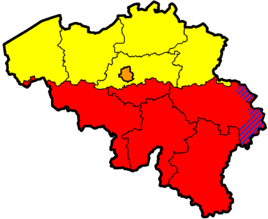Welcome to the Virtual Education Wiki ~ Open Education Wiki
Belgium
Partners situated in Belgium:
- AVNet - K.U.Leuven
- EuroPace (BE)
- Audiovisual Technologies, Informatics and Telecommunications bvba (ATiT) (BE)
One of the universities in Belgium is K.U.Leuven.
Belgium as a federal state
Belgium is a federal state with a constitutional monarchy, founded in 1830. It has a population of 10 511 382 people in a total area of 30 528 km². Belgium is a double federation of:

- 3 Communities which are responsible for the person-related issues such as education, welfare, public health and culture:
- (Dutch-speaking) / Vlaamse Gemeenschap
- the French Community (French-speaking) / Communauté Française
- the German Community (German-speaking) / Deutschsprachige Gemeinschaft
- 3 Regions which are responsible for the territorial issues such as economy, infrastructure, agriculture, environment and employment
- the Flemish Region
- the Walloon Region
- the Brussels-Capital Region (officially bilingual)
There are also four language areas:
- the Dutch area: the provinces in Flanders: Antwerp, Limburg, Flemish Brabant, West Flanders, East Flanders
- the French area: the provinces in Wallonia: Hainaut, Walloon Brabant, Namur, Luxembourg, Liège
- the German area: the 9 municipalities of the “East Cantons” / Eupen-Malmedy
- the bilingual area in Brussels-Capital with 19 municipalities
Belgium as a field of education
PUBLIC OR PRIVATE EDUCATION
The Belgian Constitution stipulates that everyone has the right to education and therefore established compulsory education. Belgium also provides that access to education is free of charge up to the end of secondary education.
Education policy in currently in the hands of the 3 communities.
Two groups organise the educational structure: the public sector (the communes, provinces and communities) and the private sector. In the public sector there are 3 educational networks:
- community schools (neutral on religious, philosophical or ideological convictions)
- subsidised publicly run schools (organized by communes and provinces)
- subsidised privately run schools: denominational schools and schools which are not affiliated to a particular religion: the Freinet schools, Montessori schools or Steiner schools, which adopt particular educational methods and are also known as ‘method schools’.
Education that is organised for and by the government (community education and municipal and provincial education) is known as publicly run education. Recognised education organised on private initiative is called privately run education.
A small number of schools in Flanders are not recognised by the government. These are the so-called private schools, which are not financed or subsidised by the government.
TERTIARY EDUCATION
In tertiary education / higher education, the academic year starts between 1 September and 1 October. The academic year ends on the day before the start of the next academic year.
The student enrols in one or more autonomous course components. He/she chooses for the already existing educational programme of 60 credits per academic year or for a flexible combination of course components (= less than 60 credits per academic year).
Academic education consists of bachelor courses and master courses. Academic education is provided at universities and at colleges of higher education operating within the framework of an association.
CONTINUING EDUCATION
1. Part-time education in the arts (DKO)
Part-time education in the arts is aimed at the artistic education of children and adults and, in doing so, at providing a contribution to their personal development.
2. Adult education
In Flanders there are several publicly funded education, training and developmental provision schemes for adults.
Within part-time adult education, 3 different actors can be distinguished:
- a continuing education (OSP): with more than 250,000 course participants, continuing education is the most important pillar in adult education. Continuing education is provided in centres for adult education which are recognised and funded by the authorities.
- b supervised individual study (BIS): BIS has discontinued. It is however published in our research list.
- c adult basic education: the 29 centres for basic adult education try to provide a broad and varied range of basic education programmes: languages, mathematics, social orientation, ICT, introduction in French and English and stimulation and student counselling activities.
In contrast with continuing education and BIS, courses in basic education are free of charge.
3. Lifelong learning
On 31 March 2003, the Training and Alignment Information Service (DIVA) was launched. DIVA co-ordinates the educational provision for adults in Flanders. DIVA facilitates the co-operation between the policy fields Education and Training, Employment, Culture and Economy. DIVA’s partners are the educational networks, Flemish Employment and Vocational Training Agency (VDAB), Flemish Institute for the Self-Employed (VIZO) and Support Centre for Socio-cultural Work (Socius). These partners represent respectively adult education (including further higher education, OSP, basic education, BIS and DKO), the training courses set up by VDAB, by Syntra and socio-cultural adult work. An awareness-raising campaign was launched: http://www.wordwatjewil.be.
Table I: Three highlighted virtual learning initiatives in Belgium
We would like to highlight three initiatives that we consider to be very important virtual learning opportunities in Belgium
| Nr | Name | Institution | City | Type |
|---|---|---|---|---|
| 1. | BIS Online | Begeleid Individueel Studeren (BIS) – Ministry of Education | Brussels | Distance learning. Inactive now. |
| 2. | Open Universiteit Vlaanderen (subdivision of OUNL) | Coördinatiebureau Vlaanderen in the University of Ghent / OUNL | Ghent | Distance learning |
| 3. | Toledo | the K.U.Leuven Association | Leuven | VLE, LMS, Student manual (PDF) |
Links
For more examples visit this page: Belgium Research or view our WORD document with detailed information for most of our examples: (link yet to come)
http://www.ond.vlaanderen.be/publicaties/eDocs/pdf/120.pdf “EDUCATION IN FLANDERS - The Flemish educational landscape in a nutshell”
http://en.wikipedia.org/wiki/Belgium
http://en.wikipedia.org/wiki/Communities%2C_regions_and_language_areas_of_Belgium